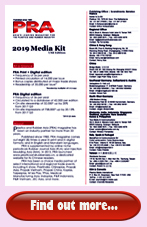PRA Chinese
Rubber Journal Asia Injection Moulding Asia Energy, Oil & Gas Asia
VISIT OUR OTHER SITES:
PRA Chinese
Rubber Journal Asia
Injection Moulding Asia
Energy, Oil & Gas Asia
Recycling: Mechanical engineering can make a huge contribution
Also, download this story from the electronic issue here
In the run-up to the K2019 show that will be focused on the circular economy, and as part of the continuing series of interviews with industry majors by German plastics machinery association VDMA, Peter Steinbeck, CSO of German extrusion machinery company Windmöller & Hölscher, gives his views on the circular economy.

With plastics having been publicly discredited, machine manufacturers, as part of the value-added chain, are also concerned by the bad image.
Steinbeck says, “As machine manufacturers, we are also shocked when we see pictures of oceans littered with plastics, and naturally we are in favour of environmental protection.” But he also adds that despite the challenges, the “great” benefits of plastics, in particular those of flexible packaging, are not too be ignored. “Our industry is jointly required to further develop plastics in its various fields of application, to face the challenges and to enhance the strengths,” he adds.
In the following interview, Steinbeck says brand owners can accelerate the process towards circular economy, with new solutions for more easily recyclable products.
How should the waste problem be tackled?
Steinbeck: We see this as a two-part task. On the one hand, we must try to distinctly increase the recycling shares in developed markets. Political regulation above all within the EU is definitely useful because it provides a secure framework. In terms of technology, efficiency, functionality and recyclability must be compatible. On the other hand, those countries must be supported that do not have functional waste managements and are therefore responsible for the pollution of oceans. We must help them introduce collection systems and also recognise plastics as recyclable material that can be used repeatedly.
What possibilities does a German machine manufacturer have to influence those countries that have no collection systems at all.
Steinbeck: I think that the German and European mechanical engineering sector is very well positioned and that we can present solutions that not only enable resource-friendly manufacture of plastics but also recycling.
Moreover, we already have solutions for comprehensive waste management. And we can show that all this is already working well here in Germany and in Northern Europe. These solutions can be perfectly transferred to other countries such as Indonesia, Vietnam or the Philippines, which are still behind in this respect. Circular economy is a topic that is by all means present outside Europe, for example in China.
At this year's Chinaplas, there was a conference on the topic of circular economy. What was your impression?
Steinbeck: I have the impression that the topic circular economy is already taking root in the minds of Chinese people. This was clearly noticeable at the conference. Brand owners make a large contribution by prescribing recycling shares or by demanding recyclability of packaging from suppliers. This will speed up the process.
If there are regulations for recycling, there must be markets and infrastructures for recycled materials – also in the food sector. This is certainly a great challenge, but here the German mechanical engineering industry as a technology leader can already make its contribution. What is important is this: Plastics have value even beyond the useful life of their first application.
Apart from circular economy, the issue is currently also about reducing the consumption of plastics, for example for packaging. Will you as a manufacturer of machines for flexible packaging lose business?
Steinbeck: This is a concern we do not have. Our customers and we ourselves have been aiming at using as little material as possible for years, using film as thin as possible and wrapping solutions for flexible packaging which is as resource-friendly as possible.
We also think that not everything must be wrapped. But the problem in the food sector is that around one-third of all food produced worldwide deteriorates because of bad packaging. You have to decide on a case-by-case basis what is best, throughout the whole process at that. If a cucumber picked by the local farmer goes to the market and is bought by the customer on the same day, everything is fine. In that case we would be the last ones to say the cucumber should be wrapped. But if you buy vegetables from Spain and a large part of it goes bad before consumption, rejecting plastic packaging will not be a good solution.
Packaging film can be furnished with many properties, for example it provides a barrier for protecting food and making it last longer. But those multi-layer films are more difficult to recycle because they consist of different types of plastics. How can you solve this paradox?
Steinbeck: You have to ask yourself has technology reached the end of its development and has everything been invented that can be invented in this field? That is certainly not the case. There are already now compositions of mono-material that are better recyclable and that have the same barrier function that multi-layer films have.
At K2019, these and other solutions will be introduced. Apart from mono-materials there will be materials allowing better dissolution of compound structures. We also have the possibility today to re-use compound structures at least for certain end products.
And there is chemical recycling whereby practically all plastic waste is boiled up into a kind of primordial soup to be restructured into new plastics chains. This development is still in its infancy.
We are convinced that strict regulations for recycling of plastics products would give the current innovation boost a concentrated direction, so that further solutions could be found.
(PRA)Subscribe to Get the Latest Updates from PRA Please click here
©2019 Plastics and Rubber Asia. All rights reserved.

©2019 Plastics and Rubber Asia. All rights reserved.
Home Terms & Conditions Privacy Policy Webmail Site Map About Us






















